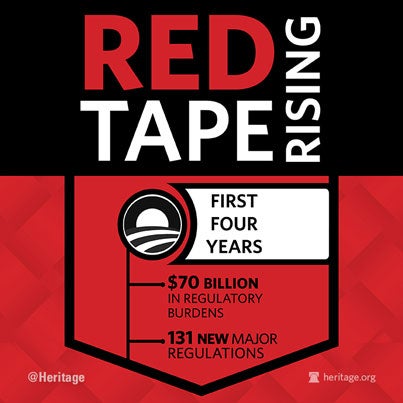Congress and the White House have been focused for much of this year on the federal budget—rightfully so, given perennial deficits and unsustainable levels of U.S. debt. However, federal spending accounts for only a portion of the burden placed on Americans by the government. Regulations impose huge additional costs, hindering job creation and innovation while undermining Americans’ fundamental freedoms.
Those costs are on the rise, as documented in a new Heritage Foundation report released today. “Red Tape Rising: Regulation in Obama’s First Term” reveals that annual regulatory costs increased by more than $23.5 billion during President Obama’s fourth year in office. This brings Obama’s first-term total to nearly $70 billion, a staggering level that is likely unmatched by any Administration in the nation’s history. And despite a much-touted initiative to weed out unnecessary regulations, only two major rule changes reduced regulatory burdens in 2012.
>>> Click for the full infographic with more details
And, the report points out, there are many more rules to come, with an extraordinarily large number of regulations in the pipeline, including hundreds required under the Dodd–Frank financial regulation law and Obamacare.
Topping the list of costly regulations in 2012 were new automobile fuel-economy standards, adopted jointly by the Environmental Protection Agency (EPA) and the Department of Transportation, which are expected to cost Americans $10.8 billion annually. The bulk of this cost will fall on drivers, who will pay an estimated $1,800 more for a new vehicle.
Coming in a close second was the so-called Utility MACT regulation at more than $10 billion annually. This 210-page regulation from the EPA sets stringent new emissions standards for utilities and other electricity generators. So costly are the standards that potentially dozens of coal-fired power plants will close, thereby undermining the reliability of the power grid and substantially raising the costs of electricity for consumers.
Congress—which shares much of the blame for excessive regulation—should act to ensure that unnecessary and excessively costly regulations are not imposed on the U.S. economy and consumers. This should include requiring congressional approval of new major regulations before they can take effect, as provided in the REINS Act now pending before Congress.
Without such decisive steps, the costs of red tape will continue to grow, and the economy—and average Americans—will be the victims.






























